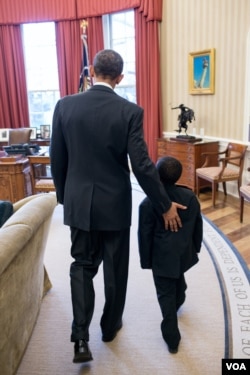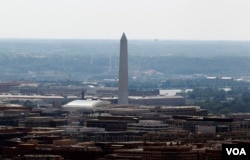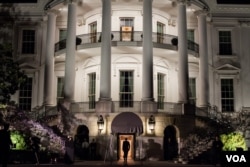Student Union
No, You Will Not Meet Obama in DC: Keith's Story
As we waited outside the international center for our taxis to arrive, up came Alex, dragging a large casket. “Good morning, guys?” he said, guiltily. He always had the air of a spy about him, and the dead body-sized case didn’t help. I rushed to open the large casket, grabbing the bag with my claws. I clipped it open and saw bags of Lays, Doritos and Oreos. “That’s my food for the next five days!” he said, smiling. “Oh! So where did you put the dead body...?” I joked.
I had brought only a small satchel, in which I’d stuffed three pairs of clothes and my tiny laptop. I planned on wearing the same socks until they smelled as bad as my excitement!
This would my first time leaving Rock Hill since I got to Winthrop in August. I was especially looking forward to the rendezvous I planned to have with President Obama. I had tons of stories to tell him about Africa. And I had stayed up all night, yawning and drooling on my desk, writing a sonnet for the occasion called “Yes We Can!”
We ended up in two taxis, crammed up in our seats, staring out as the sleepy town of Rock Hill slipped away in the rearview. Walgreens, Earth Fare, Bi-Low, B.P.
We took the taxis to Charlotte, where we boarded an Amtrak train to D.C. In my country I’d never travelled by train, in fact our trains were virtually dead. Most people travelled in kombis, or mini-buses; overstuffed with people, livestock, bicycles, and gossip. Public transport was a drag; full of endless stops by pot-bellied police officers soliciting for bribes; full of complaints about hardships.
I tried sitting next to Alex, so we could have some political discussions, but he soon fled like a fugitive saying, “You talk too much! You are annoying!” before slipping down the aisle, dragging his dead body. He sat next to a stranger who stared daggers at him on seeing the oversized suitcase.
A crazy lady sat next me. “When I get there, tell them I don’t want any trouble!” she shouted over her phone. “I just been in prison!! And I don’t want to go back coz o’ somethin' stupid! Are we clear!?” She hung-up. “So how’re y’a doing, darling?” she said to me, staring at me with sharp eyes.
After several hours, we finally got to Washington. We looped our way through underground trains before we were out in the open. “Wow!” I said, standing in front of everyone else. “D.C.’s quiet, and quaint!” It wasn’t quite the psychedelic D.C. I’d had in mind; an adrenaline-charged, action-packed metropolis with sirens, guns and excitement; it was something more elaborate. It was quiet. Peaceful. Nice!
D.C. is more of an administrative capital. Our own 7-story campus apartments looked elaborately taller than most of the buildings that I saw. But that is what made the city so spectacular! I felt like I was in a mini-city, a splendid Legoland stretching for eons. And was itching to explore!
After putting down our luggage at Hotel Harrington we found ourselves trotting across D.C., towards the White House, and I started to think about my rendezvous with President Obama, in the Oval Office. I would tell him how he is a symbol of hope, not only for Americans, but for people around the world; under the sea of flashlights, and news reporters. Then I’d hand him my poem, “Yes We Can!”
One of the girls we were traveling with was putting her enthusiasm for food to use with each new monument we passed. She licked the horses and fake people like ice-cream, making strange poses for the pictures she planned to post on Facebook.
“This one is going to be called Vanilla! That one Noodles... that one... I’ll tag all of you!..”
Alex, on the other hand hated the slow pace everyone else had adopted. He marched on like a soldier, staring ahead with his stoic eyes and probably thinking, “Those imbeciles! They get carried away by statues and rocks!”
We walked past herds of students who were also on spring break. They’d probably already bathed in the honor of seeing President Obama, I thought. Now it was our turn! It was our turn to see the maverick, with a million-dollar smile, and an infinite vision.
I held onto my poem. I felt it singing to me as I approached the White House.
“Excuse me.” said the guard. “You can’t go any further. The road is closed.”
I exclaimed in disbelief. “Does that mean...??? We can’t see the President?”
“I’m afraid so.”
I held onto the poem, and felt the weight of millions of prayers melting.
But, as I looked down at the Washington Monument, a tall obelisk staring into the heavens like a torch, I felt my hopes burning again. I was going to be in D.C. for the next five days, exploring the monuments. I was going to eventually give President Obama this sonnet, and let the prayers of millions of Africans sing along like a song. “Yes We Can!” echoed the sonnet in my hand.
It might not surprise you to find out that Keith did not get to meet President Obama on his trip. I asked him whether he really expected to be able to march into the White House and greet the president:
“I guess meeting Obama was somewhat between my overactive imagination... and an actual wish and hope. I feel silly in retrospect.”
Did it ruin your trip?
“I must admit not meeting the president did sort of ruin the trip in some way, because I was somewhat childishly hopeful. But I still found joy in the trip: seeing the monuments, eating in strange restaurants and trying sushi for the first time.”
Yes We Can, by Keith Mushonga
At the Summit of the White House you fly
Like an Eagle with wings open so wide
Your eyes see so far and beyond our sky
Guarding us like little chicks inside.
Before, It was a dream floating astream
When the world was thirsty for some hope
So our hope washed the dream, slowly downstream
And gave us more reason to sail the globe.
“Yes we can!” marched many in the streets
Packed up in podiums, with sorrows at hand,
Lost jobs lost health, all our rights in pitiful pits!
But then we marched twice to that same Summit
And found hope blooming like a blade of Wheat
Have you had any interesting travel experiences? Tell us about them in the comments, or use the form below.
Loading...
See all News Updates of the Day
- By VOA News
Competition grows for international students eyeing Yale

It’s tough to gain admission to Yale University, and it’s getting even tougher for international students as standout students from around the world set their sights on Yale.
The Yale Dale News, the campus newspaper, takes a look at the situation here.
- By VOA News
Student from Ethiopia says Whitman College culture made it easy to settle in

Ruth Chane, a computer science major from Ethiopia, writes about her experiences settling into student life at Whitman College in the U.S. state of Washington.
"The community at Whitman College made sure I felt welcomed even before I stepped foot on campus," she says.
- By VOA News
Claremont Colleges student gets a shock when she heads home to Shanghai

In The Student Life, the student newspaper for the Claremont Colleges, a consortium of five liberal art colleges and two graduate schools in Claremont, California, student Rochelle Lu writes about readjusting to her Shanghai home after spending a semester in the United States.
- By VOA News
Cedarville University aims to ease transition for international students

Cedarville University in the U.S. state of Ohio says it’s got more than 140 international students representing 44 countries.
Here, the school interviews Jonathan Sutton, director of international student services. He talks about his job and the opportunities for international students on campus.
- By VOA News
Morehouse College offers prospective students tips on applying and thriving

Morehouse College, a private, historically Black liberal arts college in the U.S. state of Georgia, offers a guide for international students interested in attending the school.
Among the tips to apply and thrive at Morehouse:
- Take advantage of the school’s orientation program
- Turn to the school’s Center for Academic Success for tutoring, support and more
- Immerse yourself in campus life via clubs and societies
- By Reuters
US reviews Columbia University contracts, grants over antisemitism allegations

The administration of President Donald Trump said on Monday it will review Columbia University's federal contracts and grants over allegations of antisemitism, which it says the educational institution has shown inaction in tackling.
Rights advocates note rising antisemitism, Islamophobia and anti-Arab bias since U.S. ally Israel's devastating military assault on Gaza began after Palestinian Hamas militants' deadly October 2023 attack.
The Justice Department said a month ago it formed a task force to fight antisemitism. The U.S. Departments of Health and Education and the General Services Administration jointly made the review announcement on Monday.
"The Federal Government's Task Force to Combat Anti-Semitism is considering Stop Work Orders for $51.4 million in contracts between Columbia University and the Federal Government," the joint statement said.
The agencies said no contracting actions had been taken yet.
"The task force will also conduct a comprehensive review of the more than $5 billion in federal grant commitments to Columbia University."
The agencies did not respond to requests for comment on whether there were similar reviews over allegations of Islamophobia and anti-Arab bias.
Columbia had no immediate comment. It previously said it made efforts to tackle antisemitism.
College protests
Trump has signed an executive order to combat antisemitism and pledged to deport non-citizen college students and others who took part in pro-Palestinian protests.
Columbia was at the center of college protests in which demonstrators demanded an end to U.S. support for Israel due to the humanitarian crisis caused by Israel's assault on Gaza. There were allegations of antisemitism and Islamophobia in protests and counter-protests.
During last summer's demonstrations around the country, classes were canceled, some university administrators resigned and student protesters were suspended and arrested.
While the intensity of protests has decreased in recent months, there were some demonstrations last week in New York after the expulsion of two students at Columbia University-affiliated Barnard College and after New York Governor Kathy Hochul ordered the removal of a Palestinian studies job listing at Hunter College.
A third student at Barnard College has since been expelled, this one related to the occupation of the Hamilton Hall building at Columbia last year.
Canada’s immigration overhaul signals global shift in student migration
From Europe to North America, nations are tightening their immigration policies. Now Canada, long seen as one of the world's most welcoming nations, has introduced sweeping changes affecting international students. The reforms highlight a growing global trend toward more restrictive immigration policies. Arzouma Kompaore reports from Calgary.
Trump administration opens antisemitism inquiries at 5 colleges, including Columbia and Berkeley

The Trump administration is opening new investigations into allegations of antisemitism at five U.S. universities including Columbia and the University of California, Berkeley, the Education Department announced Monday.
It's part of President Donald Trump's promise to take a tougher stance against campus antisemitism and deal out harsher penalties than the Biden administration, which settled a flurry of cases with universities in its final weeks. It comes the same day the Justice Department announced a new task force to root out antisemitism on college campuses.
In an order signed last week, Trump called for aggressive action to fight anti-Jewish bias on campuses, including the deportation of foreign students who have participated in pro-Palestinian protests.
Along with Columbia and Berkeley, the department is now investigating the University of Minnesota, Northwestern University and Portland State University. The cases were opened using the department's power to launch its own civil rights reviews, unlike the majority of investigations, which stem from complaints.
Messages seeking comment were left with all five universities.
A statement from the Education Department criticized colleges for tolerating antisemitism after Hamas' Oct. 7, 2023, attack on Israel and a wave of pro-Palestinian protests that followed. It also criticized the Biden administration for negotiating "toothless" resolutions that failed to hold schools accountable.
"Today, the Department is putting universities, colleges, and K-12 schools on notice: this administration will not tolerate continued institutional indifference to the wellbeing of Jewish students on American campuses," said Craig Trainor, the agency's acting assistant secretary for civil rights.
The department didn't provide details about the inquiries or how it decided which schools are being targeted. Presidents of Columbia and Northwestern were among those called to testify on Capitol Hill last year as Republicans sought accountability for allegations of antisemitism. The hearings contributed to the resignation of multiple university presidents, including Columbia's Minouche Shafik.
An October report from House Republicans accused Columbia of failing to punish pro-Palestinian students who took over a campus building, and it called Northwestern's negotiations with student protesters a "stunning capitulation."
House Republicans applauded the new investigations. Representative Tim Walberg, chair of the Education and Workforce Committee, said he was "glad that we finally have an administration who is taking action to protect Jewish students."
Trump's order also calls for a full review of antisemitism complaints filed with the Education Department since Oct. 7, 2023, including pending and resolved cases from the Biden administration. It encourages the Justice Department to take action to enforce civil rights laws.
Last week's order drew backlash from civil rights groups who said it violated First Amendment rights that protect political speech.
The new task force announced Monday includes the Justice and Education departments along with Health and Human Services.
"The Department takes seriously our responsibility to eradicate this hatred wherever it is found," said Leo Terrell, assistant attorney general for civil rights. "The Task Force to Combat Anti-Semitism is the first step in giving life to President Trump's renewed commitment to ending anti-Semitism in our schools."
- By VOA News
STEM, business top subjects for international students

The Times of India breaks down the most popular subjects for international students to study in the U.S.
STEM and business lead the pack. Read the full story here. (January 2025)
- By VOA News
Safety and visa difficulties among misconceptions about US colleges

U.S. News & World report addresses some of the misconceptions about U.S. colleges and universities, including the difficulty of getting a visa.
Read the full story here. (January 2025)
- By VOA News
Work opportunities help draw international students to US schools

US News & World Report details the three top factors in foreign students' decision to study in the U.S. They include research opportunities and the reputation of U.S. degrees. Read the full story here. (December 2024)
- By VOA News
British student talks about her culture shock in Ohio

A British student who did a year abroad at Bowling Green State University in Ohio talks about adjusting to life in America in a TikTok video, Newsweek magazine reports.
Among the biggest surprises? Portion sizes, jaywalking laws and dorm room beds.
Read the full story here. (December 2024)
- By VOA News
Harvard's Chan School tells international students what to expect

Harvard's T.H. Chan School of Public Health reaches out to international students by detailing the international student experience at the school.
Learn more about housing, life in Boston and more here.
- By Reuters
China unveils plan to build 'strong education nation' by 2035

China issued its first national action plan to build a "strong education nation" by 2035, which it said would help coordinate its education development, improve efficiencies in innovation and build a "strong country."
The plan, issued Sunday by the Communist Party's central committee and the State Council, aims to establish a "high quality education system" with accessibility and quality "among the best in the world."
The announcement was made after data on Friday showed China's population fell for a third consecutive year in 2024, with the number of deaths outpacing a slight increase in births, and experts cautioning that the downturn will worsen in the coming years.
High childcare and education costs have been a key factor for many young Chinese opting out of having children, at a time when many face uncertainty over their job prospects amid sluggish economic growth.
"By 2035, an education power will be built," the official Xinhua news agency said, adding that China would explore gradually expanding the scope of free education, increase "high-quality" undergraduate enrolment, expand postgraduate education, and raise the proportion of doctoral students.
The plan aims to promote "healthy growth and all-round development of students," making sure primary and secondary school students have at least two hours of physical activity daily, to effectively control the myopia, or nearsightedness, and obesity rates.
"Popularizing" mental health education and establishing a national student mental health monitoring and early warning system would also be implemented, it said.
It also aims to narrow the gap between urban and rural areas to improve the operating conditions of small-scale rural schools and improve the care system for children with disabilities and those belonging to agricultural migrant populations.
The plan also aims to steadily increase the supply of kindergarten places and the accessibility of preschool education.
- By VOA News
A look at financial aid options for international graduate students in US

The Open Notebook, a site focusing on educating journalists who cover science, has complied a list of U.S. graduate program financial aid information for international students.












